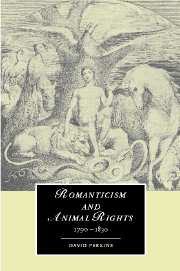Book contents
- Frontmatter
- Contents
- Preface
- Acknowledgments
- 1 In the beginning of animal rights
- 2 Grounds of argument
- 3 Keeping pets: William Cowper and his hares
- 4 Barbarian pleasures: against hunting
- 5 Savage amusements of the poor: John Clare's badger sonnets
- 6 Work animals, slaves, servants: Coleridge's young ass
- 7 The slaughterhouse and the kitchen: Charles Lamb's “Dissertation upon Roast Pig”
- 8 Caged birds and wild
- Notes
- Bibliographical essay
- Index
- CAMBRIDGE STUDIES IN ROMANTICISM
5 - Savage amusements of the poor: John Clare's badger sonnets
Published online by Cambridge University Press: 22 September 2009
- Frontmatter
- Contents
- Preface
- Acknowledgments
- 1 In the beginning of animal rights
- 2 Grounds of argument
- 3 Keeping pets: William Cowper and his hares
- 4 Barbarian pleasures: against hunting
- 5 Savage amusements of the poor: John Clare's badger sonnets
- 6 Work animals, slaves, servants: Coleridge's young ass
- 7 The slaughterhouse and the kitchen: Charles Lamb's “Dissertation upon Roast Pig”
- 8 Caged birds and wild
- Notes
- Bibliographical essay
- Index
- CAMBRIDGE STUDIES IN ROMANTICISM
Summary
Among the “sports” and diversions of Romantic England were gladiatorial battles between animals. While intellectuals and poets urged their ethos of loving communion with nature, a more numerous sociological group hugely enjoyed cockfights, dogfights, and the baiting of bulls and badgers. Occasionally bears, lions, leopards, apes, otters, polecats, foxes, or donkeys were used, though these victims were less common by 1800 than they had been earlier. These events were completely legal. They might be officially sponsored by town or city governments or carried on spontaneously in backyards and village streets. A London advertisement of 1729 and 1730 indicates what a grand entertainment might then have offered: “A mad bull to be dressed up with fireworks and turned loose in the game place, a dog to be dressed up with fireworks over him, a bear to be let loose at the same time, and a cat to be tied to the bull's tail, a mad bull dressed up with fireworks to be baited.”
Just what went on in bullbaiting can be read in Thomas Day's History of Sandford and Merton. The boys see in the distance “a prodigious crowd of people, all moving forward in the same direction.” This attracted their curiosity, and,
on inquiry, they found that a bull-baiting was on the point of taking place … A bull of the largest size and greatest beauty was led across the plain, adorned with ribands of various colors … he was fastened to an iron ring, which had been strongly let into the ground … An innumerable crowd of men, of women, of children, then surrounded the place … Presently, a dog of the largest size and most ferocious courage was let loose; who, as soon as he beheld the bull, uttered a savage yell, and rushed upon him … just as the dog was springing up to seize him, [the bull] rushed forward to meet his foe, and, putting his head to the ground, canted him into the air several yards … The same fate attended another, and another dog, which were let loose successively; the one was killed upon the spot, while the other, who had a leg broken in the fall, crawled howling and limping away … [then] three fierce dogs rushed upon the bull at once, and by their joint attacks rendered him almost mad … he roared with pain and fury … He hurried around the stake with incessant toil and rage, first aiming at one, then at another, of the persecuting dogs, that harassed him on every side, growling and baying incessantly, and biting him in every part.
- Type
- Chapter
- Information
- Romanticism and Animal Rights , pp. 89 - 103Publisher: Cambridge University PressPrint publication year: 2003

